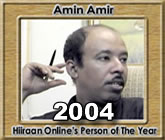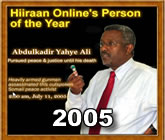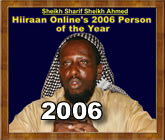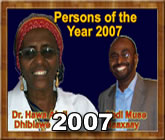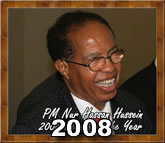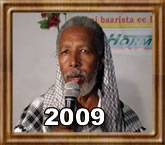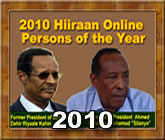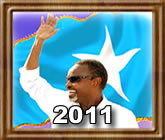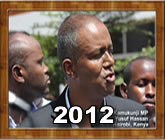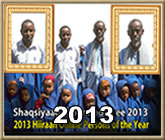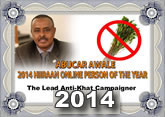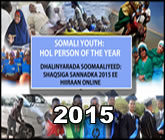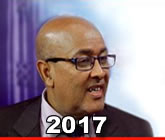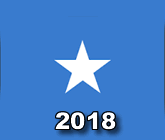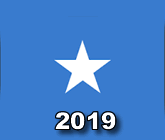
Hiiraan Online Editorial
Monday, January 08, 2018
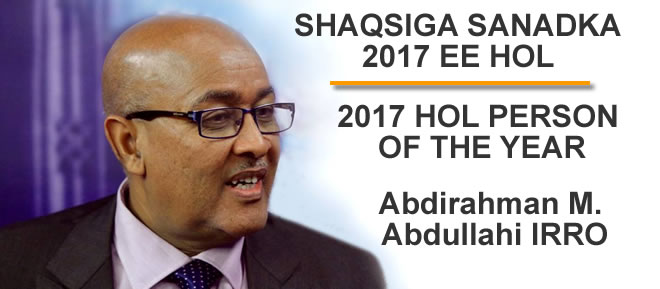
2017 is a year that Somalia and the Horn of Africa have once again dominated the headlines, from the unlikely election of a new president to a severe drought and the continued war against Al-Shabaab. In this year's major events, there is no shortage of actors – both political protagonists and antagonists, internal and external actors that deploy their influence through money, military muscle and myriad other ways that shaped Somalia and the region in 2017. However, there is one particular individual who may have possibly averted a catastrophic disaster with a courageous decision that is only expected of a statesman.
On November 13th, 556,617 voters out of the Somaliland’s 4 million people participated in its third presidential election. Three presidential candidates run for office but many analysts saw it as a tight two-man race between former minister Muse Bihi Abdi of the ruling KULMIYE (Peace, Unity and Development Party) and the former speaker of the House of Representatives Abdirahman Mohamed Abdullahi Irro of Waddani (National Party). Incumbent Ahmed Mohamed Mohamud Silaanyo was not seeking a re-election.
The National Electoral Commission made preparation across Somaliland to ensure the integrity of the election. For the first time in Africa, iris recognition-based biometric technology has been used for the Somaliland elections, although there were short comings in the use of the system.
The cheating allegation led Waddani supporters to clash with police in a violent protest. When the dust settled, five people including four civilians and a police officer were killed and Somaliland was almost granted the dubious honour of being added to the list of African democracies that experienced post-election violence. Irro, the presidential candidate, publicly accused the ruling Kulmiye party of “massive” electoral fraud and vote rigging through fake ballot papers.
The NEC dismissed Irro’s claim that fake ballot papers were being tallied in Kulmiye’s favour. The row forced the NEC to suspend the vote counting. A tentative agreement, however, was reached after a two-day meeting with Irro and his party, allowing NEC to resume tallying.
Just over a week after the initial poll, the NEC finalized tallying and announced the results. With 305,909 votes (55 percent), Musa Bihi Abdi was declared the winner. The NEC announced that Abdirahman Irro garnered a total of 226,092 votes (40.7 percent).
Abdirahman Irro reiterated his previous claims of electoral fraud and remained adamant that the vote was flawed. Further skirmishes occurred in the stronghold of the Waddani party. Allegations that under age children voted, that people voted who were registered as deceased, that government officials supporting Kulmiye canvassed voters in polling stations, that an intimidation and arrest of Waddani party agents in polling stations in Gabiley surfaced.
Tension started to build up in major cities including Hargeisa, Borame, Barbera, Burco, Erigavo, and many other areas. Supporters of the Waddani party including administrators, youth groups, and elders started meeting in various parties of the country to react to the outcome and deliberate on next steps. The information we have gathered so far indicates that the majority of the supporters of the Waddani party were of the view that they were robbed of a victory. War drums started to beat. Ideas as extreme as dividing up Somaliland emerged in some corners. Irro convened a meeting in Hargeisa for about 100 party leaders and asked for their views. The majority of the people either wanted to challenge the outcome through the supreme court or to reject it all together. After listening to the views of the party leaders and supporters, Irro thanked his party leaders and supporters and reassured them that he will value their input and would make a decision on the next move.
Irro had a choice to make: to heed the voice of reason and save Somaliland and its people from another bloody civil war by conceding/going to court or to reject the outcome, which could have enticed his supporters to challenge the outcome by any means necessary including civil disobedience and violence. Irro heeded the voice of reason and chose the former thereby keeping the hard won peace in Somaliland. In his concession speech Irro said “I took the tough decision of conceding for preserving the unity and peace of Somaliland, a decision that would not be popular among many of my supporters whose votes were stolen”. These words echo the sentiment of a leader who placed the interest of his people above personal or party interests. For this, the HOL editorial board has unanimously voted Abdirahman Mohamed Abdullahi, Irro as the Hiiraan Online’s 2017 Person of the Year.
Mr Irro’s achievements and contributions are immense including being a bright student of the Sheikh school, a career civil servant, and a politician but what makes him stand out from other Somali politicians this year is that he traded his ambition for Somaliland’s top job for the peace and unity of the people, averting potential political disaster and laying the ground for yet another peaceful transfer of power in Somaliland. This is significant in Somalia’s political history which is full of episodes whereby Somali politicians who were hungry for power enticed violence and destroyed their communities and eventually their nation.
HOL Persons of the Year since 2004
